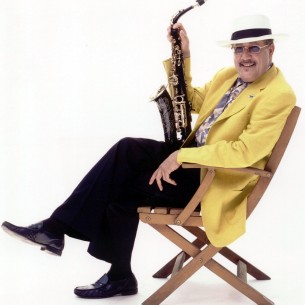By Catalina Maria Johnson
“I’m a Gemini! I need to do something new every day! The only thing I can do every single day is eat beans!”, exclaims Paquito D’Rivera, The NEA Jazz Master, 11-Grammy winner and virtuoso Cuban saxophone and clarinet player, composer and orchestra director who will be closing the International Latino Cultural Center’s Latin Music Festival with a concert at the Mayne Stageon Sunday at 7:00, is explaining by phone from his New York home how and why he likes to move easily between jazz and classical music and other genres, such as Brazilian music.
It’s also a part of his upbringing in Havana from the very beginning of his life, says the maestro,, who began to perform in public at 6 years of age, “That was the way I was raised. My dad was a classical saxophone player; he never really had an ability to improvise, but he loved Benny Goodman’ music, Ellington’s Orchestra, he loved Stan Getz’s sound”. He adds with a laugh, “My dad would play all kinds of music on his record player and say, like Ellington used to say, ‘There’s only two kinds of music, good music and bad music’”.
D’Rivera comments that nevertheless, his greatest passion is and will always be jazz, due to the freedom it allows artists in the possibility to improvise. “Of course, I would really get bored if I had to spend -it’s happened a few times- an entire concert without being able to improvise. That’s why I love jazz, it gives me that opportunity and that’s what I like doing most in life”.
He notes that nevertheless, he also has a very special place in his heart for Brazilian music, “Here [in New York] , I have met so many Brazilian musicians, and I have been accepted by them, they call on me a lot for work. I love that, that’s one of the things I most like, I enjoy learning”, he affirms. Indeed, his latest recording which was nominated for a Latin Grammy this year, is a collaboration with the Assad Brothers from Brazil. D’Rivera laments that because of the language barrier, Brazilian music is not as well known to Latin Americans, as he thinks the musicians of Brazil have “…accomplished the most balanced and perfect combination of melody, rhythm and harmony”.
D’ Rivera also mentions a Chicago artist, Chilean-Pakistani guitarist Fareed Haque , as someone who reintroduced him to classical Latin American music, such as the work of Paraguayan composer Agustin Barrios Mangoré. And all these influences, he says, will go eventually nurture his music. “I incorporate it all into jazz…this marvelous language that is the music of immigrants. This is a multinational and multicultural country. It was build by immigrants and slaves. Jazz has that spirit, the immigrant’s spirit, the spirit of someone who comes from someplace else and contributes to the land. And Latinos, including everyone from south of the Rio Grand, we have made a very important contribution to American culture and the economy. And music is no exception”.

